
Year in Review 2022
GFI was founded on the big idea that alternative proteins create a path to a food future that benefits the planet, people, and animals. In 2022, GFI’s teams around the world advanced this big idea in big ways, from advocating historic public investment in alternative proteins to expanding our global student movement to literally bringing cultivated meat to the table at COP27.
THE BIG IDEA:
About the theme
How can we feed 10 billion people by 2050 and make the global food system better for the planet, people, and animals? What is the big idea that will get us there?
At GFI, we imagine a food system that meets global climate goals while sustainably feeding billions. One that protects public health, prevents pandemics, and frees up lands and waters for restoration and recovery. One that improves the lives of billions of people and animals. Many approaches are needed to realize this future, but one thing is clear: To reimagine our food system, we must reimagine how meat is made.
GFI was founded on a big idea—that alternative proteins can set us on the path to a future of food that is sustainable, secure, safe, abundant, and just. If we ensure that alternative proteins taste the same or better and cost the same or less than conventional meat, we can produce food that people love in a way that dramatically reduces emissions, uses less land, and feeds more people with fewer resources.
This idea of advancing alternative proteins as a solution to some of the world’s most pressing problems is big, bold, and audacious. Market forces alone will not make this happen at the speed and scale that the world needs. This big idea demands significant investment in research and development for alternative proteins to reach taste and cost parity. It requires GFI teams around the world to think as big as they can to build the roadmap for the whole alternative protein industry. It compels us to act as a catalyst for the entire field, cultivating a global ecosystem of science and support for alternative proteins as a more sustainable way to feed the world.
Thanks to you, GFI is realizing the promise of this big idea. In the following sections, we invite you to read about what GFI is doing to chart the path to a brighter food future.
Thank you for thinking big with us.
GFI’s global leadership team
Bruce Friedrich, founder and president
Varun Deshpande, GFI Asia VP of strategy
Mirte Gosker, GFI Asia Pacific managing director
Gus Guadagnini, GFI Brazil managing director
Richard Parr, GFI Europe managing director
Sneha Singh, GFI India general manager
Nir Goldstein, GFI Israel CEO
Ilya Sheyman, CEO
Jessica Almy, VP of policy
Caroline Bushnell, VP of corporate engagement
Sarah David, general counsel and VP of operations
Susan Halteman, VP of development
Liz Specht, PhD, VP of science and technology
Sheila Voss, VP of communications
2022 impacts:
by the numbers
300+
Students leading the way on
alternative protein innovation
Leaders in GFI’s global student movement spurred new alternative protein research and training programs at universities around the globe. We now have 36 Alt Protein Project student chapters across North America, Europe, Asia, Africa, and Australia. Learn how we’re connecting students worldwide to big ideas.
12,000+
People brought together by GFI events
People from 50+ countries were brought together by more than 100 GFI-hosted conferences, technical workshops, roundtables, seminars, and networking events. Visit the events section to learn more about key events convened by GFI and our strategic partners.
3,350+
Media hits, quotes, and op-eds Throughout 2022, GFI’s insights and resources were sought and featured in leading global and national media outlets, helping us grow public support and political will for alternative proteins. Check out our highlights.
36
Researchers receiving GFI grants
GFI awarded over $4 million in grants to projects across 13 countries on five continents. Our areas of focus in 2022 included research to develop cost-competitive cell culture media—a key challenge illuminated by our techno-economic analysis for cultivated meat. See how this program is unlocking exponentially greater investment access across the alternative protein ecosystem.
50
Reports, resources, and peer-reviewed papers published by GFI
GFI’s reports, data, and insights received over 17,700 total downloads in 2022, and our suite of open-access resources sparked new ideas around the world. Check out a few of our favorites.
3,200+
Members of the GFIdeas community
In 2022, 654 scientists, students, and entrepreneurs joined this network to find partners, identify opportunities, and share ideas for addressing the challenges facing the alternative protein field.
Global vision,
global progress
GFI is a global network of organizations focused on one vision: creating a world where alternative proteins are no longer alternative. In Asia Pacific, Brazil, Europe, India, Israel, and the United States, we identify and advance high-impact, good food solutions—all made possible by donor support.
GFI’s global theory of change
To meet growing global demand, meat production is projected to nearly double by 2050. Making meat differently via alternative proteins—plant-based and cultivated meat—will be essential to feeding the world’s population while dramatically reducing emissions, using less land, and eliminating the need for antibiotics in our food system. Given that taste and price determine what most people eat, GFI works around the world to make alternative proteins as delicious, affordable, and accessible as conventional meat.
Working with scientists, policymakers, and industry, GFI is catalyzing the field of alternative proteins—creating a world where alternative proteins are no longer alternative.
Cultivated chicken prepared for global leaders at COP27. Photo credit: GOOD Meat
Ideas into action:
Unlocking public investment
Turning ideas into reality demands exceptional persistence.
The GFI Israel team has spent years cultivating partnerships across government agencies to ensure that Israel prioritizes alternative protein research—and in 2022, our persistent advocacy efforts produced historic results.
In May, the GFI Israel team presented to a committee of 17 senior researchers appointed to select the nation’s top research and development priorities. Out of 14 opportunities identified, the committee ranked foodtech and alternative proteins as Israel’s second-most important R&D priority. The Israeli Ministry of Innovation, Science, and Technology plans to distribute over $52 million a year in research grants to the top selected areas and undertake a national foodtech policy plan, with GFI Israel’s Alternative Proteins National Policy Plan serving as the principal roadmap.
To accelerate the development of alternative proteins, governments must invest in research that addresses foundational scientific challenges and inspires further analysis. In 2022, GFI Israel’s efforts—and those of our GFI teams around the world—did just that.
Influenced by GFI, Brazil invests in alternative proteins
GFI Brazil has been building relationships with the Brazilian government for years. In 2022, the Ministry of Science, Technology, and Innovation sought out GFI’s expertise on two requests for proposals to fund alternative protein research and development—for the first time in the country’s history. Thanks to GFI Brazil’s years of working with the Brazilian government, the Brazilian Innovation Agency set a historic precedent of investing in alternative proteins, paving the way for more significant future investment.

Turning a recommendation into impact
Following extensive meetings and technical conversations with GFI Europe, the UK’s National Food Strategy (NFS) recommended that the government invest £125 million in alternative protein research. While this recommendation was a huge step forward, it wasn’t a guarantee that funds would be directed toward the highest impact alternative protein R&D. After the NFS report was issued, GFI Europe focused on building relationships with the teams responsible for shaping the government’s response to the recommendations.
In June of 2022, the UK government published its official response to the 2021 recommendations, and the GFI Europe team was delighted to see that their efforts had been successful. The Government Food Strategy states that “the government will keep the UK at the front of this growing and innovative sector by supporting alternative protein research and innovation,” including plans “to invest over £120 million in research across the food system.”
GFI Europe also shaped the R&D priorities of the UK Research and Innovation (UKRI) national funding agency, resulting in an official report adopting our precise scientific recommendations and goals. In September, another major victory followed, with UKRI’s Biotechnology and Biological Sciences Research Council allocating £20 million to alternative protein research and inviting GFI Europe to co-lead a workshop on how to best direct the funds. Building on this momentum, the GFI Europe team continues to work with UK officials to ensure that alternative proteins are a research priority for years to come.

Spotlight: COP27, plus a meal to change the world
At the 2021 UN Climate Change Conference (COP26), transforming the global food system was little more than a side dish on a large menu of meaty topics. Thanks to GFI, at COP27 alternative proteins were a main course—literally.
GFI Asia Pacific (APAC) co-organized a historic, first-of-its-kind cultivated meat dinner for global leaders at a COP27 event. In the months leading up to this event, GFI APAC policy specialist Shuli Goh worked with the Singapore government to secure approvals from Egypt to import cultivated meat (where it is not approved for commercial sale—yet). Current and former senior officials from 10 nations—including the United Arab Emirates, which will host COP28 in 2023—joined GFI APAC managing director Mirte Gosker and Singapore Minister for Sustainability and the Environment Grace Fu for the meal. Cultivated meat’s climate summit debut was featured in media coverage around the globe, including The Washington Post, NPR, The Guardian, and CNN.
GFI also served as one of nine co-hosts of the first-ever Food Systems Pavilion at COP27. With our teams present alongside policymakers, industry executives, and climate nonprofit leaders, we placed alternative proteins on the global stage and highlighted the urgent need for governments to prioritize alternative proteins as a climate, food security, and biodiversity solution.
Government support for alternative proteins was a central theme of the 16 GFI-led sessions at COP.
“Alternative proteins are one of the most important solutions to reach climate resilience,” said GFI Brazil managing director Gus Guadagnini on the first day of the conference. “We need to invest at least $10 billion a year in alternative protein research, development, and commercialization to get this solution to the scale the world needs.”
— GFI Brazil managing director Gus Guadagnini
U.S. leadership on alternative proteins
Our U.S. policy team builds relationships and advocates at the highest levels of government to secure public investment in alternative proteins, and we celebrated major wins in 2022.
In June, GFI worked with California Assemblymember Ash Kalra to secure $5 million for alternative protein R&D at three University of California campuses. GFI’s science and technology team laid the foundation for this win over the years by cultivating an ecosystem of alternative protein researchers who are ready to deploy funding. Grantees from GFI’s research grant program are at all three of the California universities, and their GFI-catalyzed work made this milestone possible.
Following months of GFI engagement and just days before the end of the 117th Congress in December, a bipartisan group of lawmakers reached an appropriations agreement that includes $5.5 million for the U.S. Department of Agriculture (USDA) to conduct alternative protein research. Building on past appropriations, this publicly funded research will help fill knowledge gaps, optimize input crops, and improve production processes.
Alongside our advocacy for public investment in alternative protein research, GFI has been working toward regulatory approval for cultivated meat since our founding. In a defining moment for the future of our food system, in November of 2022, the U.S. Food and Drug Administration (FDA) officially gave the green light to a cultivated meat product for the very first time. UPSIDE Foods completed FDA’s rigorous review for its cultivated chicken as part of the agency’s pre-market review process, laying the groundwork for cultivated products to be sold in the United States. GFI was featured in media coverage of this historic milestone in The New York Times, The Wall Street Journal, TIME, The Washington Post, NPR, and more.
The U.S. government signals a surge ahead
The FDA announcement came just months after President Joe Biden signed an executive order marking his first significant action on alternative proteins. President Biden ordered the USDA to prepare a report on food and agriculture innovation that includes alternative proteins as a focus area, requiring exploration of high-priority research and development needs. GFI’s engagement over the years with the USDA, the Office of Science and Technology Policy (OSTP), the National Science Foundation, the National Security Council, the U.S. State Department, and other federal agencies helped build the momentum that got us to this milestone.
In response, GFI convened an invitation-only event for select academic researchers and corporate innovators to inform the work and reports of the USDA and OSTP. At the event, agency leaders heard from top scientists in both industry and academia about the importance of government support for alternative proteins. GFI will prepare a submission based on this convening for USDA and OSTP, which we expect will profoundly influence the preparation of both reports.
The White House called for further innovation in alternative proteins just weeks after Biden’s executive order. GFI submitted input to the OSTP last year advocating for alternative proteins to be included in the U.S. National Strategy for Advanced Manufacturing, and the strategy contains two mentions of alternative proteins—another major signal for progress to come:
“To continue improving food safety, and food accessibility, and food supply chain resilience, advanced manufacturing processes must fully leverage new technologies and accelerate new fields such as cellular agriculture, alternative proteins, and personalized nutrition.”
–U.S. National Strategy for Advanced Manufacturing

Spotlight: A win in Louisiana
Public investment seeds the future of alternative proteins, but unfair regulation can limit their ability to compete in the market. GFI is defending the rights of alternative protein producers to clearly, accurately, and compellingly label their products, and we celebrated a major victory in March.
Tofurky, represented by GFI lead regulatory counsel Laura Braden and the Animal Legal Defense Fund, prevailed in a challenge to Louisiana’s label censorship law in federal court. The court found that Louisiana’s law, which prohibited the use of terms like “burger” and “beef” on plant-based food labels, was more extensive than necessary to serve Louisiana’s professed interest in avoiding consumer confusion. It also found that Tofurky presented “compelling evidence” that consumers are not confused by its labeling, and the state failed to produce any contrary evidence.
The court declared Louisiana’s law unconstitutional on First Amendment grounds and enjoined the state from enforcing it—a win for all plant-based companies.
“This order is a win for consumers, who do not need government interference on the use of well-understood terms to describe plant-based products. Laws like this, ones that prevent a fair playing field for alternative protein products, should be struck down given what’s at stake: a more sustainable food system that works for everyone—farmers, food companies, consumers, and entire communities.”
– Laura Braden, GFI lead regulatory counsel
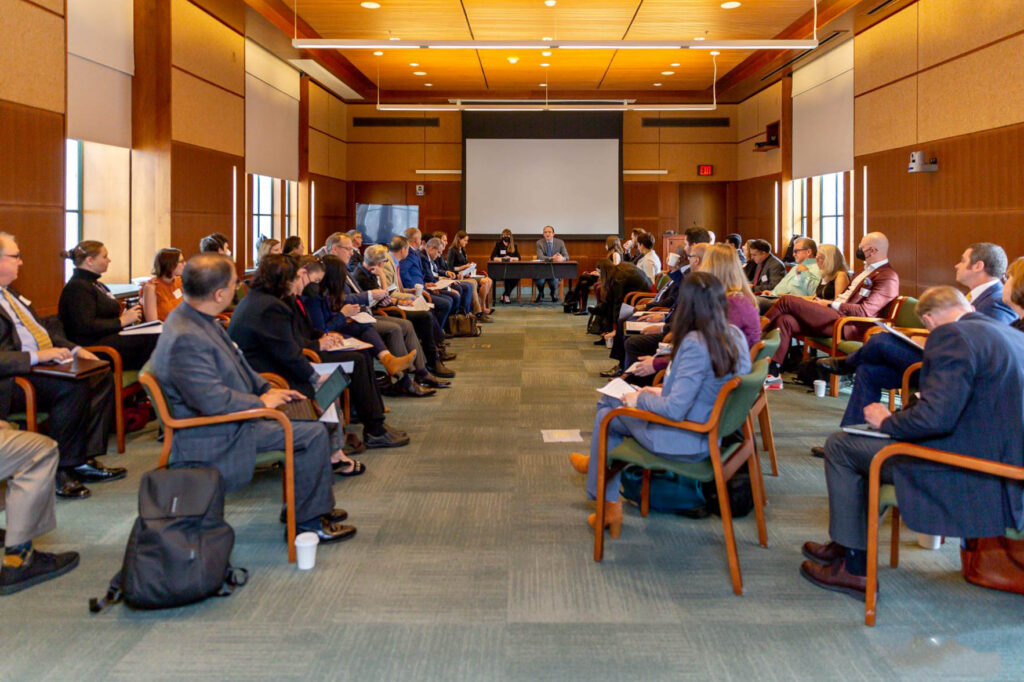
Just getting started
In 2022, our global policy work cleared obstacles, secured tens of millions in public R&D funding, and elevated alternative proteins at the highest levels of government. But this is just the beginning. A report co-funded by the UK’s Foreign, Commonwealth & Development Office estimates that the world’s governments must collectively invest $10 billion per year in alternative proteins with nearly half directed toward R&D in order to feed and sustain our growing population.
With just seven short years before 2030—the milestone year by which the world must halve emissions and protect 30 percent of global land and ocean ecosystems—investing in alternative ways of making meat is a big idea whose time has come. In 2022, GFI’s work with governments around the world helped unlock public investment in critical alternative protein R&D. Scaling up this work in 2023 and each year that follows will be essential to solving the biggest global challenges of our time.
“It’s time for an update.”
— Bruce Friedrich, GFI founder and president
Photo credit: Wildtype
Cultivating the big idea
across the industry
“In business, as in nature, a diverse ecosystem is a healthy one,” reflected GFI Europe corporate engagement manager Carlotte Lucas, having just returned from IFFA, the world’s largest meat industry trade fair. Thanks to GFI, alternative proteins were a central theme of this influential gathering for the first time.
At the May 2022 IFFA show, Carlotte and her team hosted guided tours and presentations that generated significant interest in alternative proteins from both exhibitors and visitors. “It was a delight to be able to inspire others to learn more about this exciting new field,” she said.
Trade fairs provide a unique opportunity for companies to form partnerships and learn about cutting-edge products and trends. For many companies at IFFA, the event was their first chance to learn about the alternative protein sector. GFI team members introduced industry leaders to our comprehensive lineup of resources, including data-driven analyses and reports aimed at catalyzing private sector prioritization of alternative proteins. We also made introductions between meat companies and alternative protein companies, sparking connections and getting new players involved in the sector.
“We were delighted to partner with GFI Europe to develop alternative proteins into one of the core (and fastest growing) segments of IFFA—the world’s largest meat industry trade fair. GFI Europe’s experts inspired our attendees from the established food industries about the exciting potential of plant-based and cultivated meat, their talks and tours generating a lot of enthusiasm to accelerate the development and scale-up of these sectors.”
— Johannes Schmid-Wiedersheim, Director of IFFA
An ocean of opportunity for alternative seafood
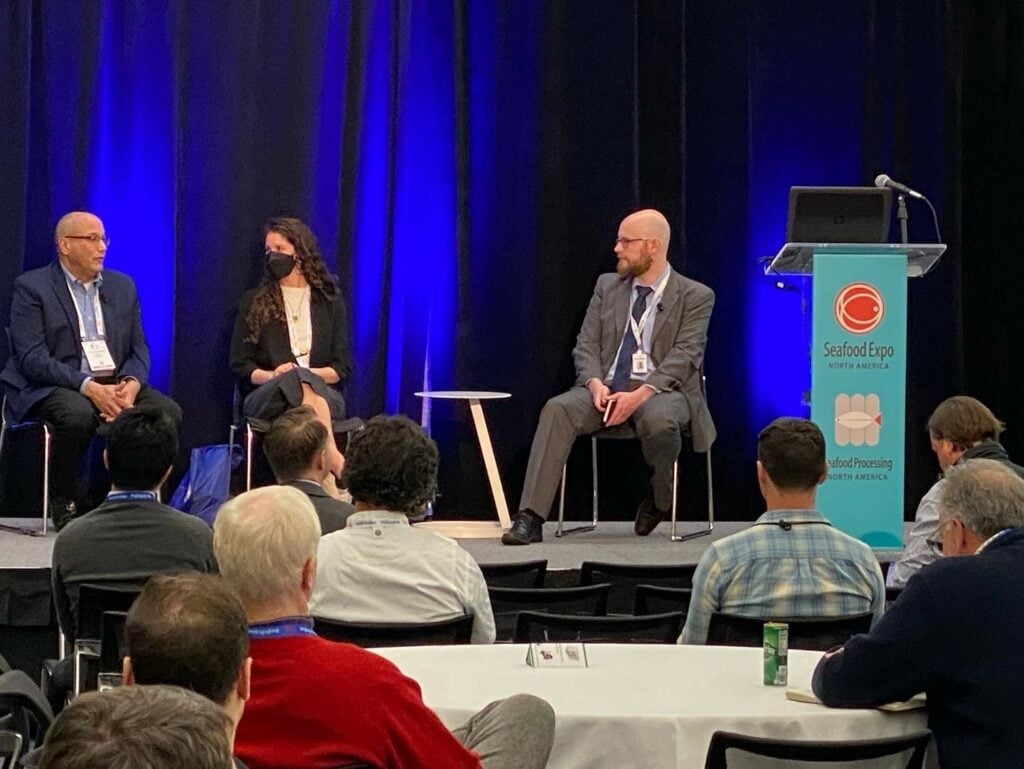
Following GFI Europe’s success at IFFA, Carlotte was invited to spend three days in September exhibiting at Fish International, Germany’s largest trade fair for the conventional seafood industry. She led guided tours of the alternative seafood booths, introduced visitors to the plant-based startups in attendance, and moderated a 90-minute alternative protein forum session. Carlotte explained: “The fact that a major conventional seafood trade fair has welcomed startups from the sustainable protein sector is a positive sign for the future of our oceans.”
While Carlotte was showcasing alternative proteins at trade fairs in Europe, GFI corporate engagement specialist Marika Azoff helped alternative proteins take the stage in March at Seafood Expo North America, the largest seafood show in the United States. Marika spoke on a panel about cultivated seafood with Lou Cooperhouse from cultivated seafood pioneer BlueNalu, which marked the first time alternative proteins were incorporated into the conference’s formal programming. At the Seafood Expo, Marika championed alternative proteins directly to conventional seafood suppliers, distributors, and the president of the National Fisheries Institute.
The next generation of industry leaders
Focused on developing the next generation of innovators, addressing key bottlenecks and commercial whitespaces, and nurturing entrepreneurship, the GFI India Smart Protein Innovation Challenge concluded its second year in 2022. A total of 745 participants from 590 colleges, universities, and organizations across India joined for intensive programming and mentorship on the business, science, and path to market for alternative proteins—with a select top 20 projects emerging victorious as Challenge-winners. Some of the projects inspired by the Challenge include a shelf-stable plant-based egg with a separate white and yolk as well as technology for using vegetable byproducts to create high-protein ingredients.
“The Challenge was a great mix of networking, peer groups, mentorship, and incentives, all of which helped us optimize our product and processes and achieve important milestones. It also helped us to build key connections for our startup.”
— Raunak Pahwa, MFP Foods
By connecting hundreds of young leaders with potential partners and resources, the Challenge is creating pathways for new talent to enter the field and power the transition to a more sustainable food future.

Spotlight: GFI’s mentor program
GFI’s new mentor program is growing the alternative protein field by empowering a critical piece of the industry: entrepreneurs. The program addresses a key need in the field, giving entrepreneurs access to expertise, resources, and guidance for taking their ideas from concept to market. By connecting new entrepreneurs with expert mentors, the program offers more personalized support than GFI’s team can provide alone, helping to shape the market and positioning alternative proteins to thrive.
Since the program’s launch last year, 24 GFI mentors have generously offered their time and expertise to alternative protein entrepreneurs, founders, and startup teams. Mentors provide tailored support to mentees and their companies as they launch and scale, advising on challenges like fundraising, legal questions, ingredient sourcing, infrastructure, pitching, and presenting.
“The mentor program offers every kind of expertise that these entrepreneurs might need, and it all dovetails really well with the other ways GFI lifts up the entire alternative protein sector.”
— Brian Cooley, Cooley Insights
Future-proofing the food system
Sustainability reporting guidelines are a crucial tool that many industries use to advance corporate social responsibility goals, but none existed for alternative proteins—until now.
In 2022, GFI and FAIRR created alternative protein-specific environmental, social, and governance (ESG) frameworks. These first-of-their-kind resources supply investors and companies with tools to monitor, measure, and report on risks and opportunities in the alternative protein industry. By providing comparable ESG data for alternative and conventional protein products, the frameworks illuminate the benefits of alternative proteins, incentivizing companies to incorporate them into strategies to meet decarbonization targets.
What’s in a name?
The future of protein.
Would you like some cells with that burger? Alternative protein scientists might not bat an eyelash at technical terms, but when it comes to getting people hungry for alternative protein innovation, words matter. The names used for different foods and aspects of the production process are critical for consumer acceptance.
In October, GFI APAC and the APAC Society for Cellular Agriculture joined more than 30 other industry leaders in announcing a first-of-its-kind memorandum of understanding aligning the Asia Pacific region on the term “cultivated” as the preferred English-language descriptor for food products cultivated directly from animal cells. Signatories of this historic agreement include nearly every cultivated food startup in the region (including those dedicated to meat, seafood, and dairy), national coalition groups, and multinational companies Cargill and Thai Union.
In 2019, GFI and UPSIDE Foods worked with Mattson, North America’s most successful independent food and beverage innovation firm, to conduct market research on the best term to describe meat cultivated from cells. We announced at our Good Food Conference that “cultivated” was the standout option for consumer appeal. Cultivated meat scientist Jess Krieger was eager to share her agreement. “‘Cultivated’ meat conjures images of agriculture and natural processes, is biologically correct, and isn’t used by any major food type,” she said. “It’s a great name for us to stand behind as an industry.”
GFI APAC’s agreement establishes a critical precedent that can be replicated in other markets around the globe, bringing us closer to a future where alternative proteins are described in approachable terms, and people everywhere are excited to take a bite.
GFI and FAIRR developed the frameworks with input and expertise from more than 50 investors, NGOs, and ESG standard-setters. After a year of joint action, we shared the frameworks with alternative protein manufacturers, ingredient suppliers, meat companies, and retailers. In the first few weeks following their launch, the frameworks were downloaded more than 800 times by investors and companies, including those specializing in alternative proteins as well as those with diversified portfolios.
“Alternative proteins represent a significant opportunity for food retailers, manufacturers, and protein producers. The GFI/FAIRR reporting frameworks give investors the information necessary to assess and value companies and their supply chains in the transition to a low-carbon economy.”
— Jared Fernandez, senior ESG analyst and proxy voting manager at investor Boston Trust Walden
By positioning alternative proteins as a major ESG opportunity, the new frameworks bring greater transparency to this growing field and enable clearer comparisons with conventionally produced proteins. Alongside GFI’s strategic engagement across the private sector, the frameworks are catalyzing investors and companies alike to prioritize more sustainable and equitable ways of meeting the growing global demand for meat.
GFI co-hosts Barclays Alternative Protein Showcase in NYC and Bank of America Alternative Proteins Conference
Committed to inspiring greater investment in the alternative protein industry, GFI’s corporate engagement team is positioning alternative proteins as a key component of sustainability and impact investing. By partnering on events with respected investment firms, GFI is educating investors and providing an insider view into the industry through company meetings, manufacturing tours, and tastings.
In June, GFI co-hosted the Barclays Alternative Protein Showcase in New York City, connecting institutional investors with 11 later-stage alternative protein companies. A few months later, GFI co-hosted the first annual Bank of America Alternative Proteins Conference in San Francisco, bringing together an audience of institutional investors to hear insights from leading alternative protein companies, taste alternative protein products, and tour an alternative protein manufacturing facility. In total, these events brought 120 investment professionals together with 23 alternative protein companies, sparking high-impact connections across the sector.
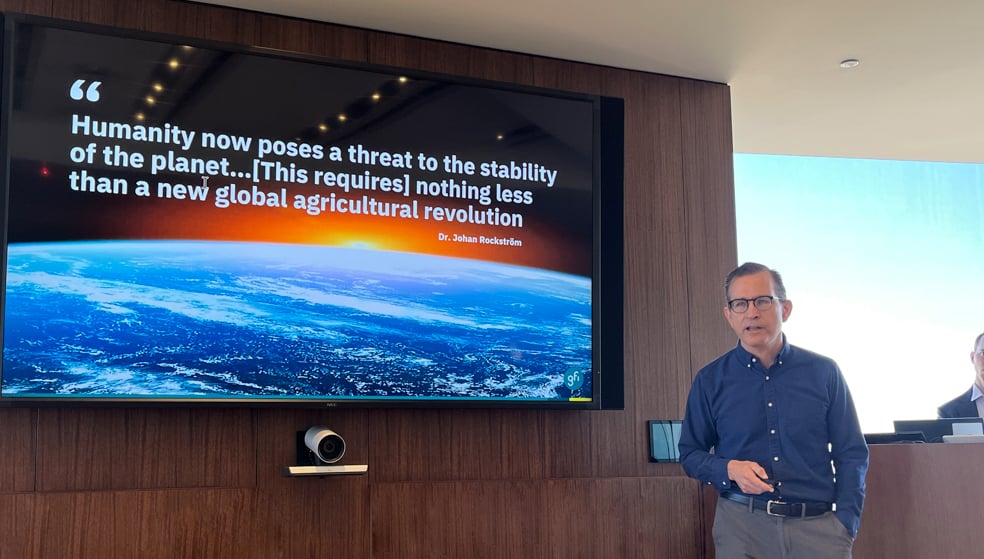
The GFI team shares a big cheer at the U.S. retreat in September
Fueled by determination
and informed optimism
GFI’s strategic pillars are shared across our network of six organizations and provide a framework for cross-team alignment, collaboration, and impact measurement.
GFI fosters a strong open-access alternative protein research and training ecosystem
We accelerate the fundamental scientific breakthroughs that drive innovation in three key ways: sharing knowledge, growing the research community, and mobilizing research funding. In 2022, GFI awarded $3.8 million in grant funding to the most promising research in the field and, in addition to our role as a direct research funder, we supported $125 million in research proposal requests to U.S. and Canadian government agencies alone.
“I donate to GFI because GFI’s mission to accelerate the development of alternative protein is critical in the fight against climate change, antibiotic resistance, and a whole host of other issues that define our time. GFI’s research, advocacy, and community building in the alternative protein space has been instrumental in the rapid progress we’ve experienced so far, and I’m incredibly excited to see their work continue into the future.”
— Arman Rafian, GFI donor
GFI influences the public sector to support alternative proteins
We advocate for public investment in alternative protein research and development (with a goal of reaching $10 billion per year), fairness in the regulatory sphere, and freedom to use language consumers understand on product labels. In 2022, our global teams secured tens of millions of dollars in public investment in alternative protein research, championed alternative proteins to government leaders and agencies, celebrated historic victories in our regulatory work, and rallied bold action to accelerate support for alternative proteins as a critical piece of the climate change mitigation puzzle.
“In a world of skyrocketing protein demand, plant-based and cultivated seafood present new oceans of opportunity for forward-thinking food companies that want to thrive over the long term. Consumers have justifiably high expectations when it comes to alternative proteins, but producers are ready to rise to that challenge and usher in a world where alternative seafood is no longer alternative.”
— Maarten Geraets, Managing Director, Alternative Proteins, Thai Union Global PCL (the world’s largest producer of canned tuna)
GFI influences the private sector to prioritize alternative proteins
We work with leaders and innovators across the private sector to advance the alternative protein industry and enable market breakthroughs by providing open-source data and consumer insights. In 2022, we launched first-of-their-kind ESG frameworks to help companies meet their sustainability goals, consolidated market research on cultivated meat terminology into valuable resources for the field in Europe and Asia, and published our most comprehensive State of the Industry reports yet.
“Today, we are reaching out to the countries of the world, offering our technology and seeking out your partnership in making our global food system more sustainable, more resilient. Very soon, you won’t have to imagine a better food system for our children—you’re going to taste it.”
— Nir Goldstein, GFI Israel CEO, speaking at Israel’s Independence Day celebration at the UN
Stay up to date on future progress on each of these pillars by signing up for our newsletters.
Sparking innovation:
Growing tomorrow’s scientific ecosystem
It was more than just a coincidence.
In April 2022, a biophysicist at the University of California Los Angeles received a five-year, $1 million grant from the National Science Foundation (NSF) to expand her cultivated meat research program. That same month, two co-founders of plant-based meat company Umaro Foods pitched their seaweed protein bacon on Shark Tank, hot on the heels of their announcement that they’d raised $3 million in investment. And only a few months earlier, a Clemson University plant scientist was awarded a $200,000 grant from FoodShot Global to continue her research on sustainable, high-quality protein crops for plant-based meat.
What appears on the surface to be three separate stories of alternative protein progress actually began together in 2019, when biophysicist Dr. Amy Rowat, entrepreneurs Beth Zotter and Dr. Amanda Stiles, and plant scientist Dr. Dil Thavarajah were part of the inaugural group of grantees funded by GFI’s Research Grant Program. All of these innovators earned their first-ever alternative protein research funding from GFI.
This is exactly what GFI’s grants program was designed to do: empower researchers across a wide array of adjacent fields to turn their attention toward challenges in alternative proteins. Their research efforts fill critical knowledge gaps and spur future research efforts, unlocking exponentially impactful follow-on investment. “All of these journeys can be traced back to one idea,” says GFI scientific research advisor Dr. Erin Rees Clayton. “It’s a simple one. To create a better food system, we must identify the most important questions in the alternative protein field and prioritize the research needed to answer them.”
In the four years since the program’s first request for proposals, GFI has awarded $16.8 million to 102 research projects across 18 countries, planting the seeds for future funding and ensuring that we’re growing a robust ecosystem of problem-solvers focused on our big idea.
The matchmaker of the alternative protein ecosystem
Powered by donor support, GFI is accelerating alternative protein innovation by matching researchers with opportunities for funding and collaboration.
Last year, GFI Israel partnered with the Israeli Ministries of Innovation and Agriculture to launch an Alternative Protein Research Grant program, paving the way to fund 15 new projects. The Israeli government matched GFI’s contribution four to one for the $1.2 million program. This collaboration is a key example of how GFI leverages donor support as a force multiplier. Through this partnership, we are using our scientific expertise to direct funding toward the most neglected and important research in the field.
This is just one in a series of GFI Israel’s successes working alongside the government to fund critical research and catalyze the growth of the alternative protein field. Following years of discussions with the GFI Israel team, the Israel Innovation Authority (IIA) granted a landmark $18 million in April to establish a Cultivated Meat Consortium. The initiative aims to create advanced, scalable technology for cultivated meat by facilitating the exchange of ideas between academia and industry. In the words of GFI Israel senior scientist Dr. Tom Ben-Arye,
“By increasing the funding for academic research and strengthening academia-industry collaborations, we can develop a synergistic ecosystem that integrates the brightest minds in tissue engineering, food engineering, meat science, and industrial production.”
In December, the IIA committed an additional $14 million to establish research and development infrastructure for fermentation, a vital piece of the alternative protein industry. This milestone was the result of extensive advocacy from GFI Israel, emerging from the roadmap detailed in our Alternative Proteins National Policy Plan. GFI Israel’s VP of strategy and policy Alla Voldman shared, “In recent years, fast-growing Israeli startups were faced with the choice to invest millions of dollars in developing infrastructure or move their operations abroad. The IIA’s tender will help solve one of the biggest bottlenecks for alternative proteins and will enable startups to scale in Israel.”

Spotlight: on science
In 2022, to further strengthen this growing scientific ecosystem, GFI conducted analyses to identify the most urgent challenges in the field and used the findings to direct resources toward solutions:
Based on the analysis in our report “Anticipating 2030 Production Requirements” released in January, our science and technology team realized that fats would soon become a limiting factor for alternative proteins if novel sources or production methods aren’t developed. As a result, we focused one of our 2022 requests for proposals for our grant program on alternative fats, awarding several grants in this area and publishing approaches to solving the issue on our blog.
Similarly, GFI commissioned a techno-economic analysis of cultivated meat in 2021 to determine what research would be most likely to accelerate the entire sector. We identified the cost of cell culture media (the nutrients that feed animal cells during the cultivation process) as a limiting factor for cultivated meat production, and this informed another of our 2022 grant program focus areas. We ultimately funded three grants totaling $763,000 to help solve the high cost of two specific media components identified in the techno-economic analysis.
Catalyzing new solutions across the field
Making meat without animals is the key to a more sustainable and secure food system—but there’s a long road ahead before we reach taste and cost parity with conventional meat.
GFI Europe’s Cultivated Meat Innovation Challenge, launched in partnership with the European Institute for Innovation and Technology (EIT Food), offered research funding to projects identifying how to drive down cell culture media costs (a significant challenge to commercializing cultivated meat). GFI strategically leveraged research grant program funding for a match with EIT Food, channeling funds that would not have otherwise gone toward alternative proteins into key research gaps. This collaboration also strengthened GFI’s relationship with EIT Food, which takes pride in being the world’s largest and most dynamic food innovation community.
The Challenge winners were announced in October and received prizes of €100,000 each, with additional funding available to support commercializing their ideas over the next three years. Among the winners were an Israeli company developing technology that enables tobacco plants to produce growth factors and a Portuguese research organization assessing whether microalgae can grow ingredients for cultivating seafood. GFI Europe science and technology manager Seren Kell was captivated by the burst of innovation made possible by the Challenge, sharing, “It’s fascinating to see the sheer diversity of these ideas and the wide range of organizations that have come forward to crack the biggest challenges with approaches that can bring down costs and help cultivated meat be affordable to all.”

“All of these journeys can be traced back to one idea. It’s a simple one. If we want to create a better food system, we must identify the most important questions in the alternative protein field and prioritize the research needed to answer them.”
– GFI scientific research advisor Erin Rees Clayton
Our science-driven mission
Around the world, GFI’s teams are building a network of innovators to supercharge the alternative protein ecosystem. GFI India has been living out this vision since 2017 through their national Mission for Smart Protein. In India, “smart protein” is the term used for alternative proteins, and it’s an apt one: Just as smartphones catapulted India to the digital age, smart proteins offer a chance to usher in a stronger, more resilient, and equitable food system. As part of their Mission for Smart Protein, GFI India is working with government agencies and institutional partners to establish a council of scientific leaders called the Smart Protein Scientific Forum. This group will map smart protein opportunities in India across the value chain and identify topic areas for R&D and talent development. GFI India also has plans to establish research, incubation, and commercialization hubs at universities across India to build talent pools and nurture the next generation of smart protein innovators.
“There is no pathway to achieving global climate goals without reimagining the way we produce protein. By teaching the science of making meat from plants and cultivating it from cells, nations can empower students with the skills necessary to save their own future.”
— Ryan Huling, GFI APAC senior communications manager in Nikkei Asia

Spotlight: The alternative protein workforce of tomorrow
In 2022, GFI APAC researched the skills gap for the alternative protein sector in Singapore and recognized an urgent need to train new talent. With research in hand, we signed a memorandum of understanding (MOU) with three institutions of higher learning and three industry players to ensure that Singapore’s workforce is ready to meet the growing needs of the alternative protein sector.

During his closing address at the Global Agri-Food Scientific Symposium co-hosted by GFI APAC, director of Nanyang Technological University’s food science & technology program Prof. William Chen emphasized the importance of upskilling Singapore’s workforce and cited our work on the MOU: “As a first step, my program at Nanyang Technological University has recently joined forces on a new memorandum of understanding […] to train up a new generation of ‘future food’ scientists who can sustain Singapore’s booming alternative protein sector over the long term—and we invite everyone in this room to join us in that effort.”
In the coming months, we will be supporting the development of apprenticeship programs that prepare future leaders in alternative protein innovation.
Connecting students worldwide to big ideas
“It was exciting to teach something that was brought forward by students,” said Douglas Phanstiel, professor of cellular biology at the University of North Carolina at Chapel Hill. Inspired by the UNC-Chapel Hill chapter of GFI’s Alt Protein Project, Pof. Phanstiel taught the university’s first course on alternative proteins in the spring 2022 semester.
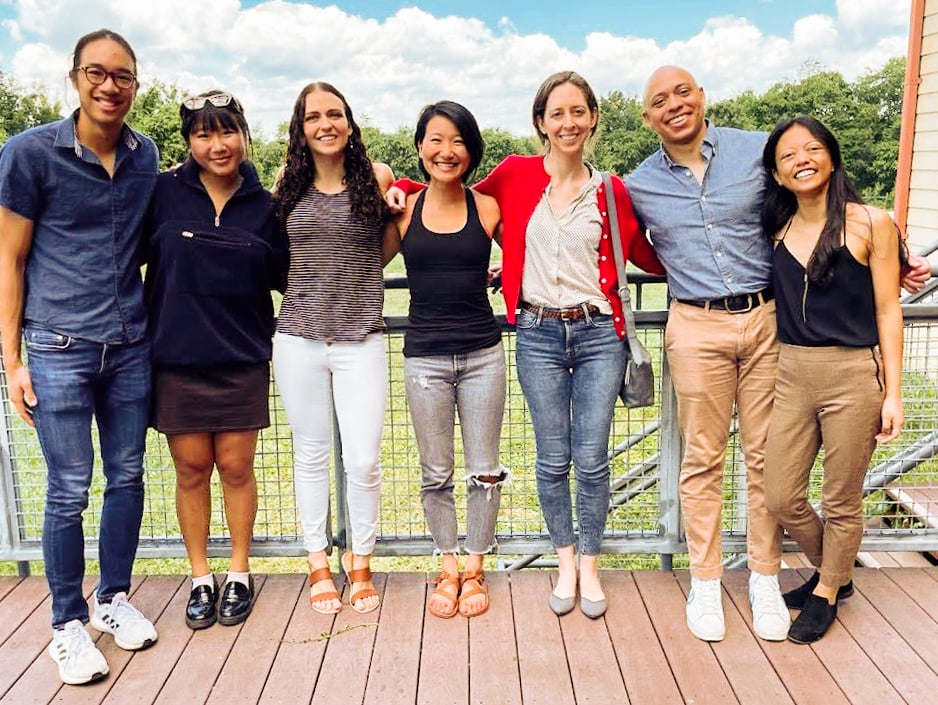
GFI team members, Amy Huang and Christina Aguila, meet up with members of the Johns Hopkins Alt Protein Project.
The Alt Protein Project is GFI’s global movement that empowers students to lead the charge of food system innovation. Now operating with 36 chapters across 17 countries and five continents, the project is designed to transform universities into engines for alternative protein education and research. The program welcomed 20 new student groups in 2022, including our first groups in Asia, Africa, and Australia, as well as a pan-European group at EIT Food.
Student leaders from the Alt Protein Project have already gone on to start new courses and companies and advocate for alternative proteins on the global stage. In November, co-founder and director of research at the University of Nigeria Alt Protein Project Anchang Mumukom Maximus spoke about “Food system careers of the future” at a COP27 panel discussion organized to center youth leadership. Anchang shared: “In 10 years, I see myself in the alternative protein field. I see myself, in the future, like a mentor, mentoring young scientists that want to take up careers in the alternative protein field.”
For GFI associate director of scientific ecosystems Amy Huang, who created the Alt Protein Project, connecting the next generation of innovators takes persistence, commitment, and the support of a global community.
“There’s this powerful sense of momentum, and we’re part of an exceptional moment, but this progress is not inevitable. Thanks to our community of supporters, we’re broadening the alt protein ecosystem and making way for new talent to change the trajectory of our food system for good.”
– GFI associate director of scientific ecosystems Amy Huang
Sharing big ideas
In 2022, GFI and our strategic partners published authoritative reports, articles, and data-driven analyses that amplify key insights and spark innovative ideas. Used extensively across the entire sector, these resources catalyze research and inform promising initiatives that are building a more sustainable and just future of food.
Reports, articles, and in-depth analyses
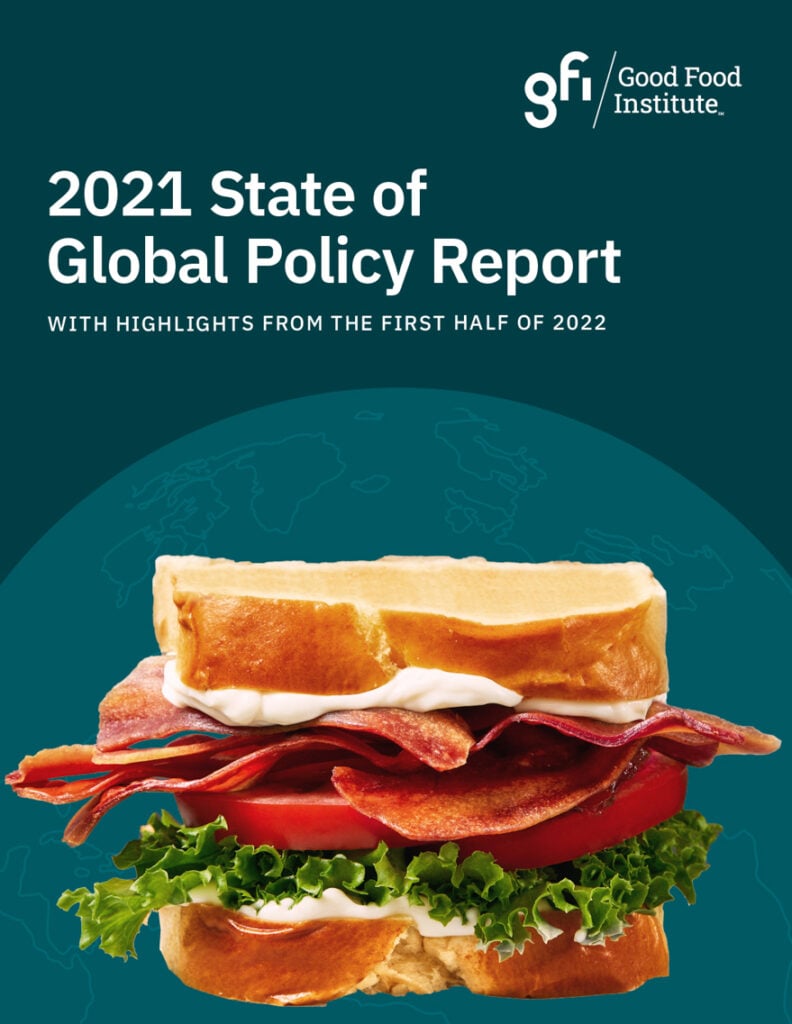
State of Global Policy Report
OCTOBER 2022
The first analysis of the global policy landscape for alternative proteins, GFI’s inaugural State of Global Policy Report analyzes public investments in alternative proteins and regulatory progress on bringing them to market, revealing that Israel, Singapore, Canada, and Europe are leading the way in dedicating significant funds to the sector.
Nature Biotechnology: Researchers have a golden opportunity to transform meat production
SEPTEMBER 2022
Published with the goal of inspiring new talent to strengthen the ecosystem, this feature essay about the alternative protein sector focuses on how the field is part of a growing industry with myriad opportunities for young researchers.
Plant-based meat: Anticipating 2030 production requirements
JANUARY 2022
A scenario-based analysis outlining expected ingredient volume and manufacturing facility needs, this report identifies bottlenecks and production targets the industry must meet to satisfy anticipated global market demand for plant-based meat in the next decade.

“Sustainable proteins will play a significant role in developing a food system fit for the future. How quickly we transition to these foods will depend on many things, but attracting talented and passionate researchers to this space will be critical.”
— Seren Kell, GFI Europe science and technology manager in Nature Biotechnology
- June 2022
“Food giants can help put alternative meats on everyone’s table” in The Bulletin of the Atomic Scientists - August 2022
“Recent progress of cultivated meat in Asia” in Food Materials Research - October 2022
Why the United States Should Champion Alternative Proteins as a Food and National Security Solution
(co-authored with Climate Advisers) - October 2022
“Transforming a 12,000-year-old technology” in Nature Food - November 2022
European messaging for cultivated meat: Evidence-based recommendations on cultivated meat communications
in French, German, Italian, and Spanish
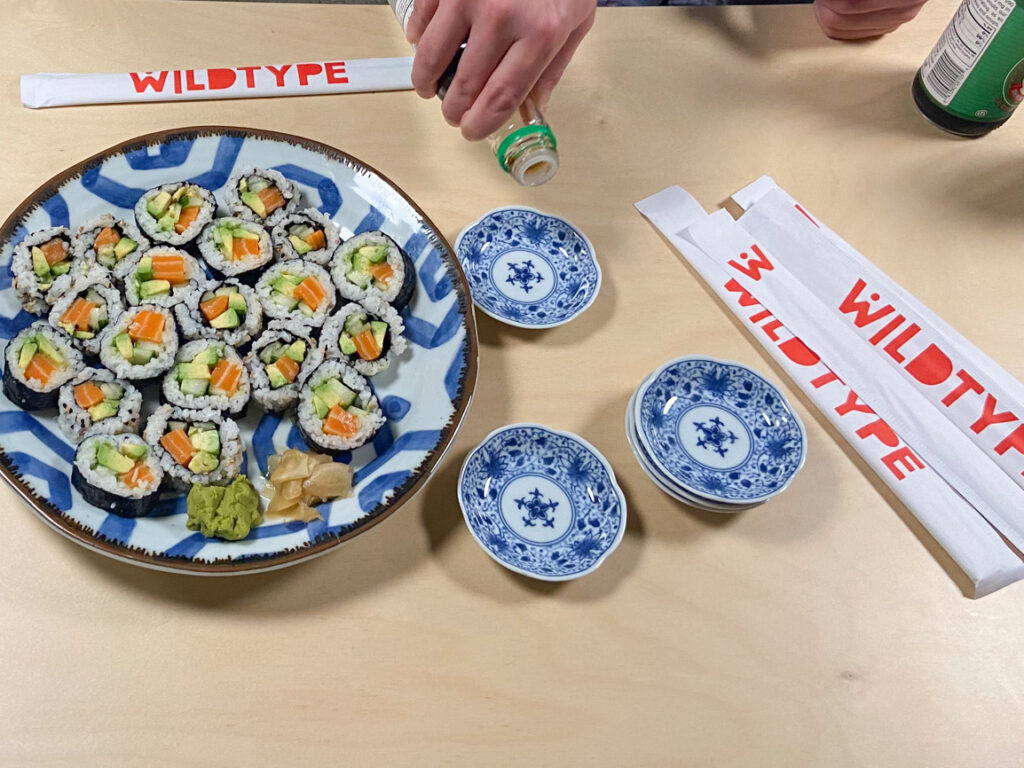
“We have been making meat from live animals for 12,000 years, of course, but with an accelerating climate crisis and a population of 10 billion to feed by 2050, growing crops to feed farm animals simply does not make sense.”
— Bruce Friedrich, GFI founder and president in Nature Food

Spotlight: on GFI industry resources
Our global corporate engagement teams analyze the market to identify emerging opportunities and ensure that actionable, open-source market data and consumer insights are available to all. Below are two examples of industry resources released by GFI that provide deep dives into the business developments, policy shifts, and scientific advances propelling the alternative protein sector.
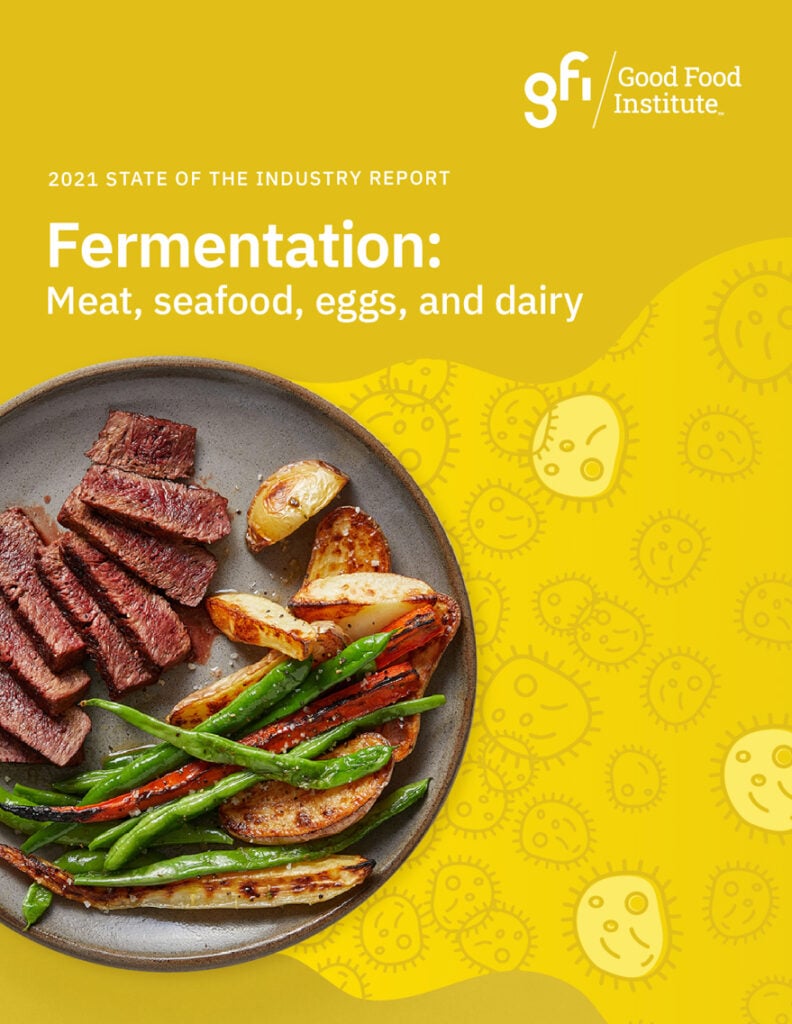
GFI’s State of the Industry Reports
These are the most comprehensive and authoritative global analyses of the alternative protein landscape that exist. They drill down into investment and sales data, new technologies, and regulatory considerations to provide a close look at the alternative protein industries. The reach of the reports is broad and global: As of October 2022, this year’s reports have been downloaded more than 6,200 times. The four webinars covering the report garnered 676 total live attendees and over 7,400 views of the recordings, and 198 individual connections were made across virtual speed networking mixers following the webinars.
GFI Israel’s State of Alternative Protein Innovation Report
This report provides a detailed snapshot of the alternative protein industry in Israel. It reveals that the country is a world leader in plant-based alternative protein investment, ranking second only to the United States in terms of private-sector investments in the alternative protein industry as a whole.

Spotlight: on SciTech resources
GFI’s global science and technology teams are building a library of resources, research tools, and databases designed to advance research, help scientists overcome technological bottlenecks, and build the scientific ecosystem. A few highlights from 2022:
GFI’s plant-based deep dives on crop development, ingredient optimization, and end-product formulation and manufacturing were published in February by GFI senior scientist Dr. Pri Panescu. These resources will play an important role for academics and industry professionals seeking a comprehensive understanding of the fundamentals and remaining knowledge gaps in the plant-based realm.
GFI’s State of the Science Snapshots are a new series designed to convey the frontier of knowledge in the alternative protein field. These presentations by scientific subject matter experts cover the most exciting developments in alternative protein science, funding, and the talent and training ecosystem.
GFI’s Alternative Protein Literature Library was launched in August by our science and technology experts following an extensive deep dive into the literature on plant-based, cultivated, and fermentation-derived proteins. This one-of-a-kind resource contains all the most relevant publications, patents, and theses in the alternative protein field.
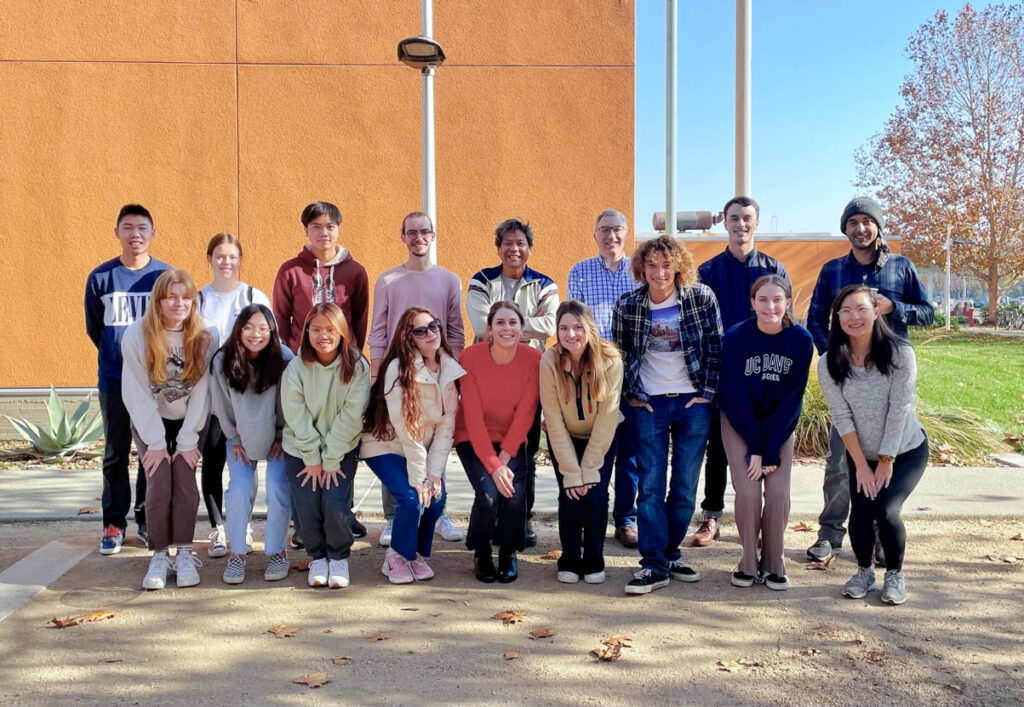
GFI as connector and catalyst
GFI-convened events
By embracing our role as convenor for the alternative protein sector, GFI and our strategic partners, including GFI Consultancy (GFIC) in mainland China, connected over 12,000 people from all over the world to build a more sustainable and just food system.
Highlights:
GFI Israel co-hosts alternative proteins-dedicated event for 60 global ambassadors
In partnership with the Israeli Ministry of Foreign Affairs, GFI Israel called for ambassadors to promote national alternative protein strategies in their home countries. Following the event, the Ministry sent an official letter to all Israeli ambassadors abroad with GFI resources and requested that they include alternative protein-related initiatives in their 2023 strategic plans.
GFI’s science and technology team co-hosts career pathways seminar series
This global series, co-hosted with several key professional associations including the Biomedical Engineering Society, focused on illuminating career pathways in the alternative protein space. By collaborating with prominent professional associations, we expanded our networks and encouraged emerging leaders from diverse disciplines to enter the alternative protein field.
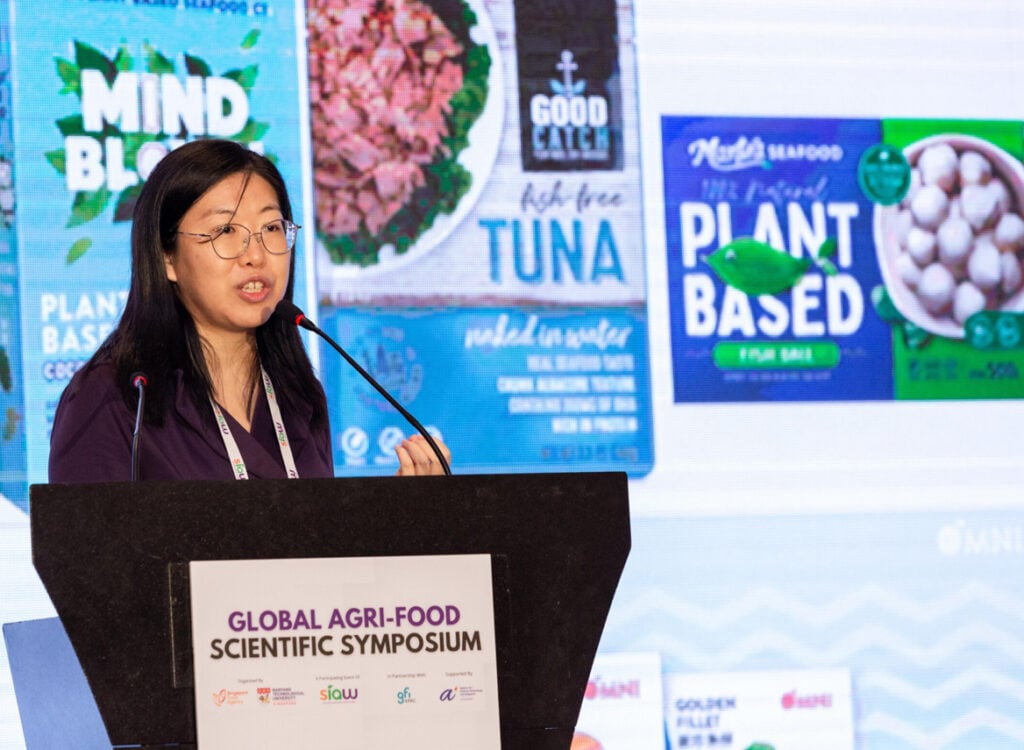
GFI APAC co-organizes Global Agri-Food Scientific Symposium
Joining forces with the Singapore Food Agency and Nanyang Technological University, GFI APAC launched the first-ever scientific summit in the history of Singapore International Agri-Food Week, an event spotlighting the latest innovations in supply chain resilience, urban food systems, sustainable proteins, and affordable nutrition.
GFI India hosts Smart Protein Summit
GFI India welcomed 580+ participants over two days for panel discussions and roundtables across industry, policy, and science, as well as an expo hall and tasting tour.
GFI presents Science and Business of Alt Protein seminars
We co-hosted monthly webinars and presentations bringing together a network of entrepreneurs, scientists, students, and subject matter experts who are driving alternative protein innovation.
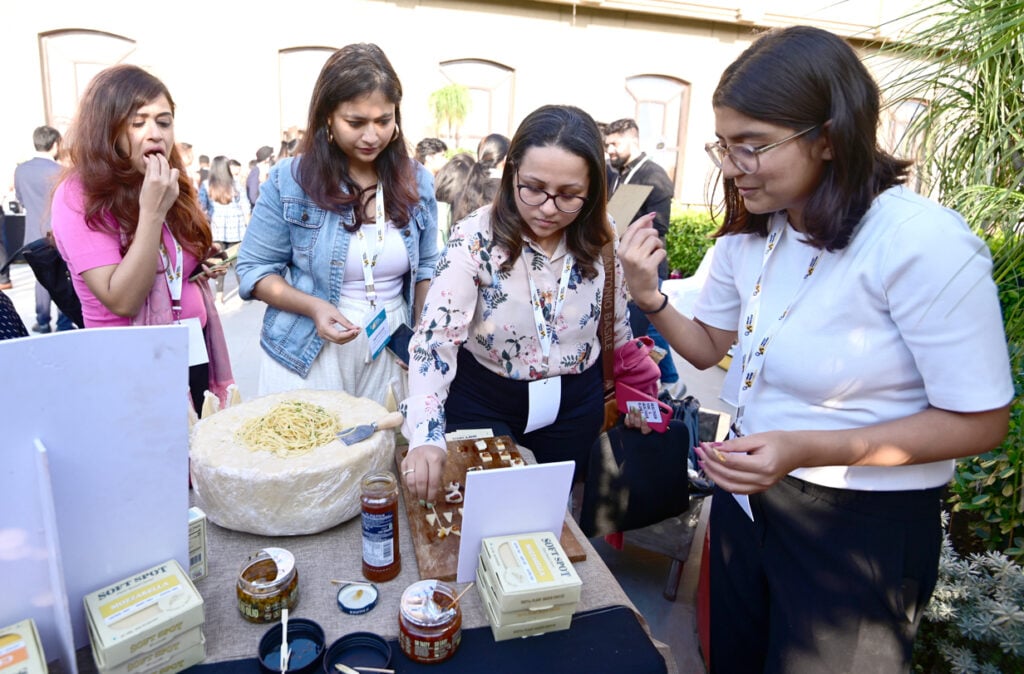
Other events led by GFI and our strategic partners
UC Davis Alternative Protein Summit | GFI x Cell Valley Labs: Bay Area Networking Mixer | Barclays Alternative Protein Showcase | Bank of America Alternative Proteins Conference | Cultivated Meat Collaborative seminar series | GFI Israel x Climatech: Our Plate Our Planet | LINC seminars and networking sessions | Advancing alternative proteins: A networking event for scientists | GFI APAC Science of Alt Proteins seminar series | GFIdeas India city meetups | Ask GFI: Alt Protein Careers | State of the Industry webinar series | GFIC scientific seminar series | GFIC x Association of Overseas Chinese Food Professionals: Alternative Protein workshop
GFI on the global stage
From Sharm El-Sheik to São Paulo, GFI’s international team of experts made sure that alternative proteins earned a place on the world stage in 2022.
Highlights:
COP27
GFI experts gathered in Sharm El-Sheikh, Egypt alongside world leaders, innovators, and problem-solvers to attend COP27. GFI co-hosted the first-ever Food Systems Pavilion and helped shape programming for many other pavilions and United Nations Framework Convention on Climate Change events.
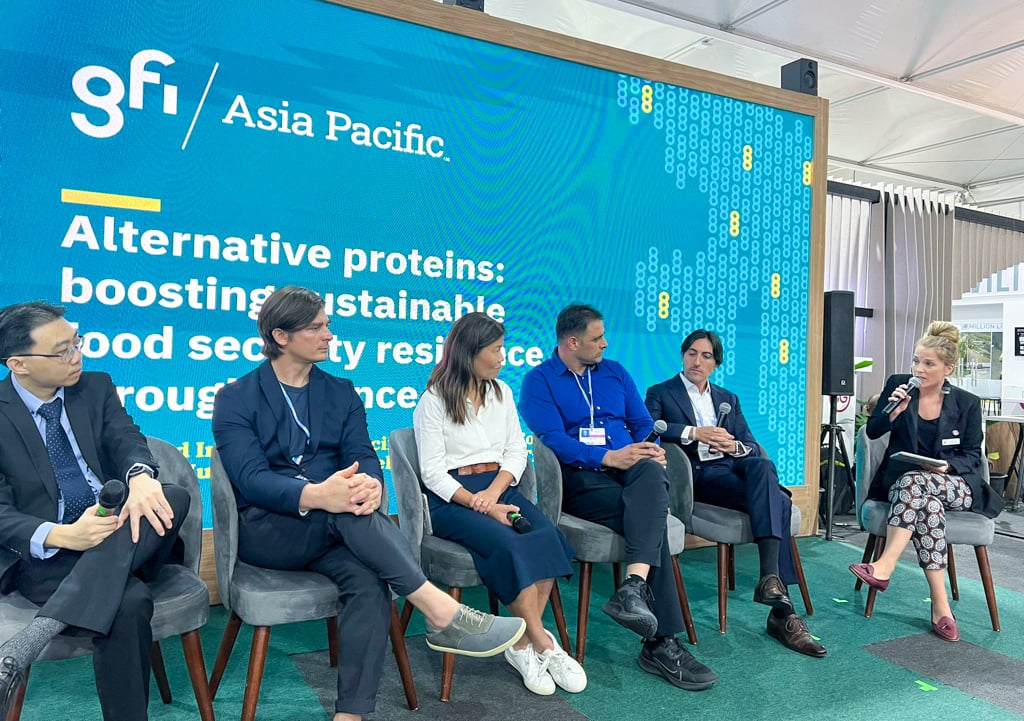
FAO roundtable on cultivated meat and the future of food security
GFI Brazil science and technology specialist Dr. Amanda Leitolis presented at this meeting in Tel Aviv, co-hosted by the Food and Agriculture Organization of the United Nations and the Israeli Ministry of Health. Participants included food system leaders from the United States, Israel, China, Brazil, the United Kingdom, and Australia who shared their cultivated meat production processes, discussed cultivated food safety, and reviewed strategies for communicating with future consumers.
Israel UN celebration
Israel honored its 74th Independence Day with a celebratory event at the UN focused on the nation’s global leadership in alternative proteins. The event’s three speakers were Israeli President Isaac Herzog, Israeli UN ambassador Gilad Erdan, and GFI Israel CEO Nir Goldstein. As a nod to the common Israeli practice of an Independence Day barbecue, the UN event showcased five leading Israeli alternative protein startups, featuring chickpea protein-based meat, fried plant-based eggs, and more.
SFA Roundtable on Novel Foods
GFI lead scientist Dr. Elliot Swartz participated in an invitation-only roundtable on novel food regulations hosted by the Singapore Food Agency in October. This gathering was convened to help governments worldwide understand the process that Singapore used to approve cultivated meat sales and inspire more countries to follow in their footsteps.
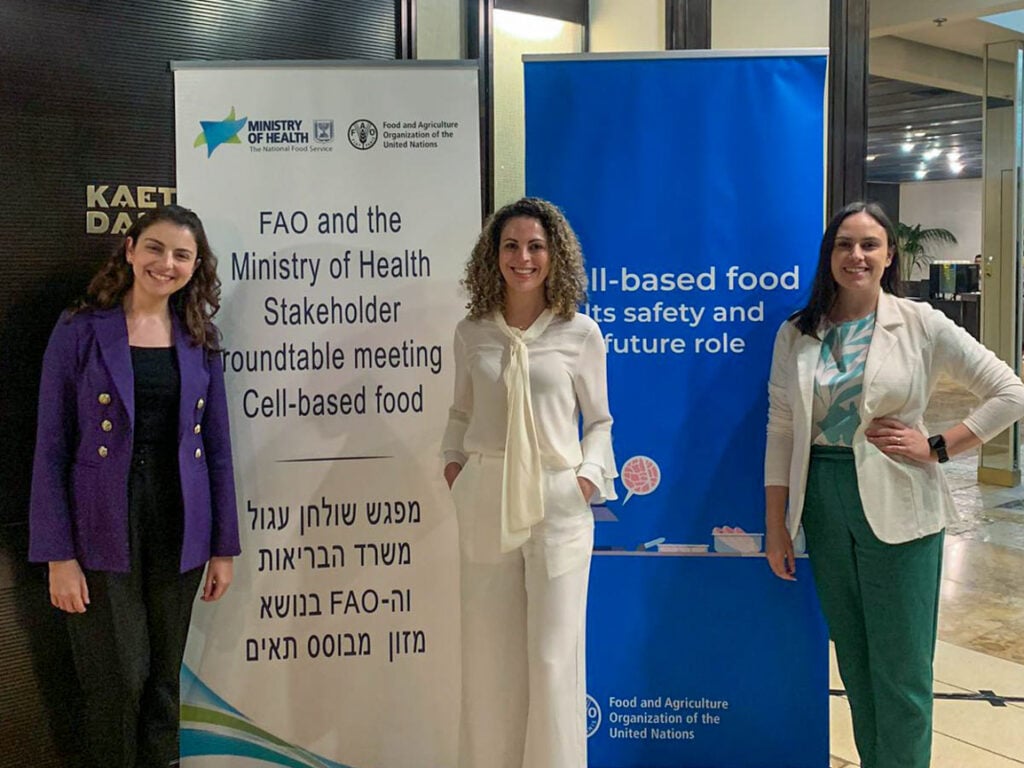
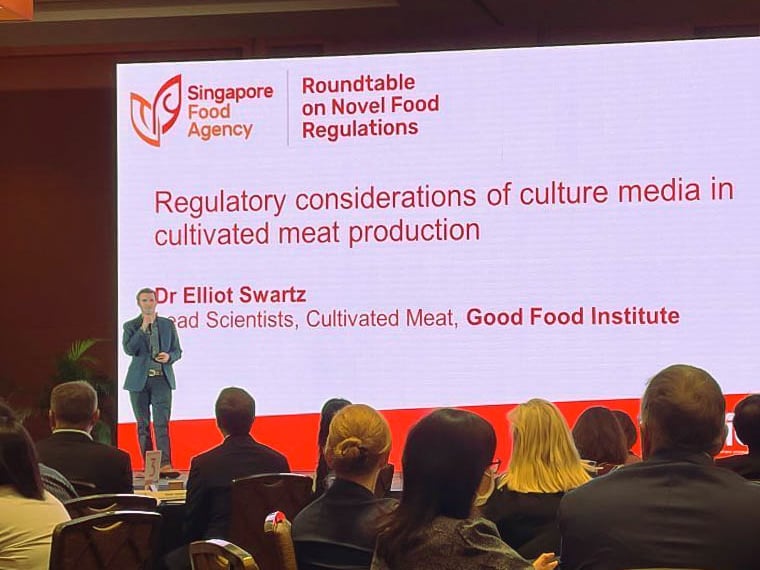
Other events featuring GFI and our strategic partners
45th Codex Alimentarius Commission meeting | 30th annual Food Forum organized by the National Academies of Science, Engineering, and Medicine | FAO Sustainable Bioeconomy Working Group | UN General Assembly Science Summit | World Food Forum | Consumer Electronics Show | SXSW | Devex | Nutri Ingredients Summit | FHA-Food & Beverage | Consumer Dimensions of Future Foods Symposium | CleanTech Forum | Food For Future Summit & Expo | Global Futures Conference | VERGE 22 | Future Food Tech | AltProteins 22 | 2022 Annual Meat Consumption Conference | IFFA | Fish International | EU Bioeconomy Conference | Technology for Change Week Asia | Dubai Expo 2022 | Copenhagen Bioscience Conference on Microbial Foods | The Hebrew University Annual Conference on Sustainable Food Systems | Uppsala Health Summit

Spotlight: Solving the food code
When it comes to global food standards, GFI teams around the world think big. GFI is sharing expert insights to impact how plant-based, cultivated, and fermentation-derived proteins are regulated around the world.
The Codex Alimentarius (“Food Code”) Commission is an international food standard-setting body established by the UN’s Food and Agriculture Organization and the World Health Organization. As of this past year, Codex is considering work on new standards for alternative proteins. It’s Codex’s first time taking up this topic in a comprehensive way, and GFI is emerging as a leader in the global discussion.
We have an integral role as an official observer organization, a designation that’s not available to companies and allows us to contribute to the standard-setting process. Following consultations with industry representatives and other NGOs, GFI recommended several steps for Codex in advancing its work on alternative proteins to promote consumer safety and fair trade—and make it easier for alternative protein companies to do business.

“Codex can work with observers like GFI to deliver capacity building efforts and programmes, such as virtual webinars aimed at deepening countries’ understanding of novel foods.”
– GFI APAC policy specialist Shuli Goh in CODEX, the annual report of Codex Alimentarius
Recordings for many GFI-convened conferences and events are accessible via our events page.
GFI in the news
GFI’s insights were sought out by the world’s leading media outlets, providing prominent platforms to grow public support and political will for alternative proteins as a global solution to global problems.
January 2022
“The world will not get to net-zero emissions without addressing food and land. Alternative proteins, including cultivated meat, can be a key aspect of how we reduce the emissions from our food system. It won’t be possible to actually meet our obligations under the Paris Climate Agreement unless industrial meat production goes down.” — Caroline Bushnell, GFI VP of corporate engagement

April 2022
“With adequate investment and support, fermentation-enabled proteins could almost single-handedly resolve the global protein deficit, while simultaneously mitigating ecological degradation and delivering the familiar tastes and flavours that Chinese consumers crave.” — Mirte Gosker, GFI APAC managing director

May 2022
“Over the last few years, a lot of our work with plant-based startups and bigger corporations alike is coming to fruition. With popular instant delivery platforms launching plant-based products, it’s now easier than ever for consumers to access foods that provide all the sensory and social elements that animal-derived meats offer, without breaking the planet.” — Varun Deshpande, GFI Asia VP of strategy

July 2022
“[State-funded research can be seen] as a government declaration, for prioritizing the field at a national level and creating a national and international ‘rising tide’.” — Alla Voldman-Rantzer, GFI Israel VP of strategy and policy

October 2022
“[T]hough the world is innovating rapidly on electricity and transportation, food production’s inefficiencies and external costs have been largely ignored. The analogy with renewable energy is apt: Mainstream goals for renewable energy and electrification of transport are to reduce environmental impacts, not to try to convince the world to consume less energy and drive less. Governments should think about alternative proteins the same way.” — Nigel Purvis and Bruce Friedrich, GFI founder and president

November 2022
“This is huge for the industry. For the very first time, this is the FDA giving the greenlight to a cultivated meat product. This sets a precedent. Now we really shift focus towards what really matters in this industry, which is scale up.” — Liz Specht, GFI VP of science and technology

VP of science and technology Dr. Liz Specht was featured on Vox’s inaugural “Future Perfect 50” list
This list honors changemakers across disciplines and fields who are helping us achieve a better future. The piece on Liz highlighted her unique contribution to the future of food: “Scientists, investors, and entrepreneurs want in on the meat-free revolution. Specht has been there to guide them—and accelerate the whole field.”
Illustration by Rebecca Clarke for Vox
GFI Israel CEO Nir Goldstein honored by The Marker
Nir Goldstein was chosen as one of the 100 most influential leaders in Israel by The Marker, one of Israel’s leading business magazines. The magazine recognized Nir’s impact through the major role GFI plays in Israel, stating that “GFI Israel published an alternative proteins national plan less than a year ago and has been actively involved in […] virtually all significant governmental decision-making concerning the field.”

Powered by philanthropy
“It’s been clear to me for many years that GFI is a navigational light, a brilliant and welcome gleam indicating the way towards a better future for humans, non-humans, and all of life on Earth.” — Dave Doody
“Working in the cultivated meat industry, I speak with investors, policymakers, and executives from large food companies, and am impressed by how often they mention that GFI sparked their interest in the industry.” — Parendi Birdie, Impact Investor
“My time in the U.S. Air Force trained me to make decisions that achieve the best outcomes, which I now apply to the world’s most complex challenges. I’m excited about GFI’s practical approach to changing the food system because it puts human nature at the center of the solution, which will lead to outsized effects on everything from biodiversity to climate change.” — Jared Johnson
“GFI’s theory of change is a pragmatic solution to global challenges that can feel insurmountable. Their focus on analyzing impact gives us confidence that our philanthropy is being deployed for maximum impact. We’re honored to support GFI’s work!” — Sally Tsai & Wayne Chang, Affinity Impact
“We celebrate and encourage investment in alternative proteins. But if you’re interested in truly maximizing your impact, a philanthropic gift to GFI supports hundreds of scientists and companies and acts as a force-multiplier, supercharging your mission impact.” — Emily Johnson, GFI Europe senior philanthropy manager
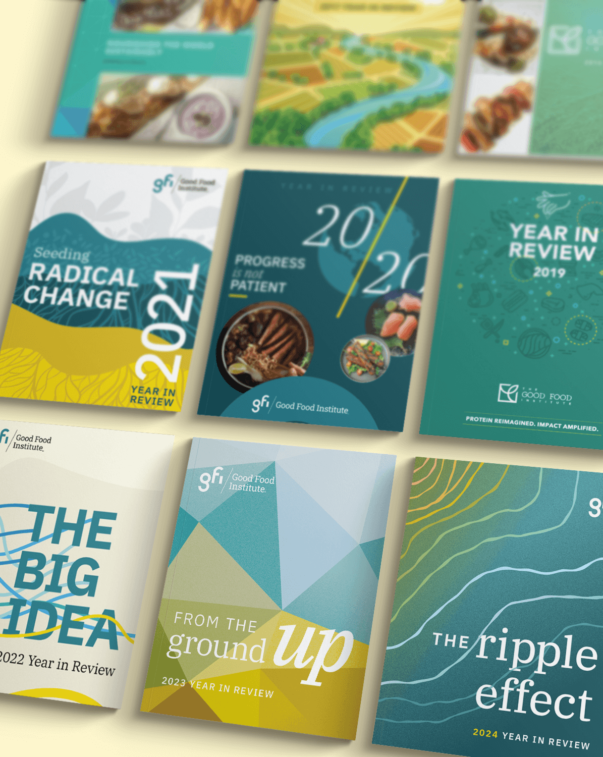
Page
Year in Review
Discover how we’re creating a world where alternative proteins are no longer alternative. Dig into our latest and past annual reports.


